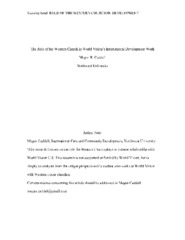The Role of the Western Church in World Vision’s International Development Work
Abstract
As the largest Christian humanitarian organization in the world, World Vision naturally asks churches to partner with them in their mutual Biblical calling to serve the poor. As its foundational methodology, World Vision believes that best practices in community development happen from empowering locals to find their own solutions to their poverty situations. This thesis explores what opportunities the Western donor-Church has to make an impact on a developing community as they engage in partnership with World Vision. As a result of experiencing World Vision’s work first hand in rural Guatemala, over 30 hours of interviews with key World Vision stakeholders, and the application of insight acquired through the International Care and Community Development Program at Northwest University, the findings of this study indicate that the Western donor Church can best support World Vision’s work by being educated advocates of effective community development. Further, the Church can support the poor by financially coming alongside organizations like World Vision who have educated, dedicated local staff and applicable programming on the ground in order to continue to empower people to find their own solutions to their poverty situations.
Contents
Methods. Definition of terms
Discussion. Exploring the missions movement of the Western Church; Analysis of short-term missions; Case study of short-term missions; World vision and mission
World vision and the Church. Church engagement history; The challenge
Recommendations. Defining partnership; Donor education; Suggested tools
Original item type
Microsoft Word (DOCX)
Original extent
52 pages
Subject
Collections
Copyright
This original work is protected by copyright. Copyright is retained by the author(s). Works may be viewed, downloaded, or printed, but not reproduced or distributed without author(s) permission.


 Maintained by the Northwest University Library
Maintained by the Northwest University Library